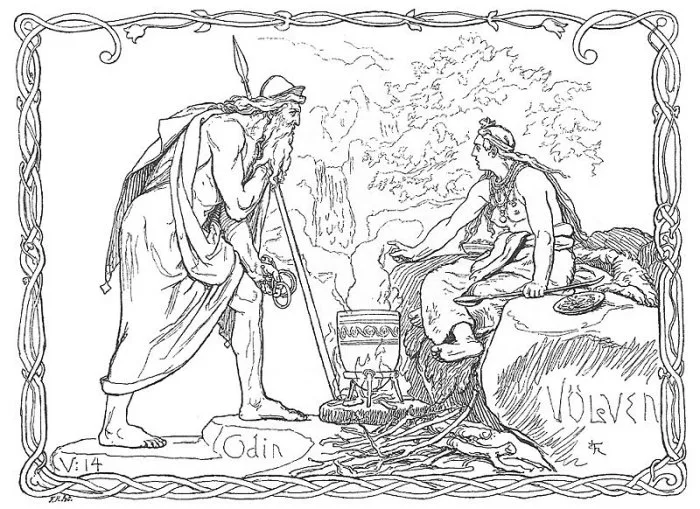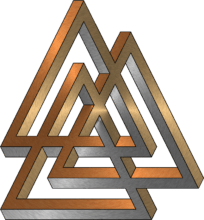
The Prophecy of the Seeress
© 2023 Edward Pettit, CC BY-NC 4.0 https://doi.org/10.11647/OBP.0308.01
- ‘A hearing I ask from all kindreds,
greater and lesser, the sons of Heimdallr!
You wish, Valfǫðr, that I well recount
ancient tales of the living, those which I recall from longest ago. - ‘I recall giants, born of old,
those who formerly had fostered me;
nine worlds I recall, nine wood-dwelling women(?),
the glorious measure-tree, beneath the ground. - ‘It was early in ages when Ymir lived;
there was neither sand nor sea nor cool waves;
no earth existed at all, nor sky above,
a gap of gaping abysses(?), and grass nowhere. - ‘Before the sons of Burr lifted up lands,
they who gave shape to glorious Miðgarðr;
the sun shone from the south on the hall’s stones,
then the ground was overgrown with green leek. - ‘Sól, companion of Máni, cast from the south
her right hand over the sky-horse-deer(?);
Sól did not know where she had halls,
stars did not know where they had stations,
Máni did not know what might he had. - ‘Then all the great powers, the most holy gods,
went to their doom-seats, and deliberated about it:
they gave names to night and its kindred,
called them morning and midday,
afternoon and evening, to count the years. - ‘The Æsir met on Iðavǫllr,
they who erected an altar and a temple high;
they set up forges, fashioned treasure,
shaped tongs and made tools. - ‘They played at tables in the meadow, were merry,
there was for them no whit of a want of gold;
until three maidens of giants came,
immensely mighty, from Jǫtunheimar. - ‘Then all the great powers, the most holy gods,
went to their doom-seats and deliberated about it:
who should devise the lord of dwarves
from Brimir’s blood and from blue limbs. - ‘There Mótsognir was made greatest
of all dwarves, and Durinn second;
they made many man-shapes,
[these] dwarves, from earth, as Durinn said. - ‘Nýi and Niði, Norðri and Suðri,
Austri and Vestri, Alþjófr, Dvalinn,
Bívǫrr, Bávǫrr, Bǫmburr, Nóri,
Án and Ánarr, Ái, Mjǫðvitnir, - ‘Veigr and Gandálfr, Vindálfr, Þráinn,
Þekkr and Þorinn, Þrór, Vitr and Litr,
Nár and Nýráðr — now I have enumerated —
Reginn and Ráðsviðr — the dwarves rightly. - ‘Fíli, Kíli, Fundinn, Náli,
Hepti, Víli, Hánarr, Svíurr,
Frár, Hornbori, Frægr and Lóni,
Aurvangr, Jari, Eikinskjaldi. - ‘It’s time to count the dwarves in Dvalinn’s company
for the descendants of men — down to Lofarr:
they who set out from Salarsteinn
for the dwellings of Aurvangar at Jǫruvellir. - ‘There was Draupnir and Dólgþrasir,
Hár, Haugspori, Hlévangr, Glói,
Skirvir, Virvir, Skáfiðr, Ái, - ‘Álfr and Yngvi, Eikinskjaldi,
Fjalarr and Frosti, Finnr and Ginnarr;
that will be remembered as long as the world lasts,
the long list of Lofarr’s forefathers. - ‘Until three came from that company,
strong and kind, Æsir, to a house;
they found on the shore, with little strength,
Askr and Embla, lacking fate. - ‘They possessed no breath, they had no inspiration,
no locks or voice or good colors;
Óðinn gave breath, Hœnir gave inspiration,
Lóðurr gave locks and good colors. - ‘I know a standing ash, it’s called Yggdrasill,
a tall tree doused with white mud;
from there come dews, those that fall in dales;
it always stands, green, above Urðr’s spring. - ‘From there come maidens, knowing many things,
three [maidens], from the sea which stands under the tree;
one was called Urðr, the second Verðandi,
— they inscribed on a stick — the third Skuld;
they laid down laws, they chose lives
for the sons of men, the fates of men. - ‘She recalls it, the first tribe-war in the world,
when they stuck Gullveig up on spears,
and in Hárr’s hall burned her;
thrice they burned the thrice-born,
often, not seldom, yet she still lives. - ‘Heiðr they called her, wherever she came to houses,
a seeress of good prophecies, she drummed up spirits(?);
she knew sorcery, she practiced sorcery while possessed,
she was ever the delight of an evil bride. - ‘Then all the great powers, the most holy gods,
went to their doom-seats and deliberated about it:
whether the Æsir must pay a great penalty,
or all the gods must have offerings. - ‘Óðinn let fly and shot into the army —
that was still the first tribe-war in the world;
broken was the board-way of the Æsir’s stronghold,
the Vanir bestrode the plains with a battle-spell. - ‘Then all the great powers, the most holy gods,
went to their doom-seats and deliberated about it:
who had mingled all the air with mischief,
and given Óðr’s wife to the giant’s family. - ‘Þórr alone was there, swollen with anger,
he seldom sits when he hears of such;
oaths were stamped on, words and sworn declarations,
all the binding speeches which had passed between them. - ‘She knows of Heimdallr’s hearing,
hidden under the light-accustomed holy tree;
she sees a river splashing in a muddy fall
from Valfǫðr’s pledge. Would you know still [more], or what? - ‘Alone she sat outside when the old one came,
Yggjungr of the Æsir, and looked into her eyes:
“What do you ask me? Why do you test me?
I know it all, Óðinn, where you hid your eye,
in the famous spring of Mímir;
Mímir drinks mead every morning
from Valfǫðr’s pledge!” Would you know still [more], or what? - ‘Herfǫðr selected for her rings and torcs,
treasure, wise words and prophecy-staffs;
she saw far and wide over every world. - ‘She saw Valkyries, come from far and wide,
ready to ride to the god-realm.
Skuld held a shield, and Skǫgul next,
Gunnr, Hildr, Gǫndul and Geirskǫgul;
now Herjann’s women are enumerated,
ready to ride the earth — Valkyries. - ‘I saw for Baldr, for the bloody sacrifice,
for Óðinn’s child, fates concealed;
[full-]grown there stood, higher than the fields,
slender and most fair, the mistletoe. - ‘From that tree, which seemed slender,
came a dangerous harm-shaft; Hǫðr shot.
Baldr’s brother was soon born;
that son of Óðinn struck when one night old. - ‘He never washed his hands or combed his head,
before he carried Baldr’s opponent to the pyre;
but Frigg wept in Fensalir
for the woe of Valhǫll. Would you know still [more], or what? - ‘A captive she saw lying under Hveralundr,
like to malevolent Loki in form;
there sits Sigyn, though not at all
well-pleased about her man. Would you know still [more], or what? - ‘A river falls from the east through venom-dales,
with knives and swords. It’s named Slíðr. - ‘There stood to the north on Niðavellir
a hall of gold of Sindri’s kindred;
and another stood at Ókólnir,
the beer-hall of a giant, and he’s called Brimir. - ‘She saw a hall standing far from the sun,
on Nástrǫnd, the doors face north;
venom-drops fell in through the roof-vent;
that hall is wound with the spines of snakes. - ‘There she saw wading swift currents
perjured people and murder-wolves,
and the one who seduces another’s wife;
there Niðhǫggr sucked the corpses of the deceased,
the wolf tore men. Would you know still [more], or what? - ‘East in Járnviðr sat the old one
and there gave birth to Fenrir’s brood;
from among all those a certain one becomes
the moon’s pitchforker(?) in troll’s form. - ‘He fills himself with the flesh of the doomed,
reddens gods’ dwellings with red blood;
dark was the sunshine then in following summers,
all weather treacherous. Would you know still [more], or what? - ‘A giantess’s herdsman, happy Eggþér,
sat there on a grave-mound and struck a harp;
above him, in the gosling-tree, crowed
a fair-red cockerel — he’s called Fjalarr. - ‘Gullinkambi crowed above the Æsir,
he wakens heroes in Herjafǫðr’s hall;
but another crows beneath the earth,
a sooty-red cockerel, in the halls of Hel. - ‘Garmr howls loudly before Gnipahellir,
the fetter will break and the ravener run free;
she knows much lore, I see further ahead,
about the great doom of the powers, of the victory-gods. - ‘Brothers will battle and slay each other,
cousins will break the bonds of kin;
it’s harsh in the world, great whoredom,
axe-age, sword-age — shields are cloven —
wind-age, wolf-age, before the world collapses;
no one will show mercy to another. - ‘Mímr’s sons play, and destiny is kindled
at [the sound of?] the resonant Gjallarhorn;
Heimdallr blows loud — the horn’s aloft —
Óðinn speaks to Mímr’s head. - ‘The ancient tree groans, and the giant breaks loose;
the ash of Yggdrasill shakes as it stands. - ‘Now Garmr howls loudly before Gnipahellir,
the fetter will break and the ravener run free;
she knows much lore, I see further ahead,
about the great doom of the powers, of the victory-gods. - ‘Hrymr drives from the east, heaves his shield before him,
Jǫrmungandr writhes in giant-rage;
the snake lashes waves, and the eagle shrieks,
the fallow-nosed one tears corpses, Naglfar breaks loose. - ‘A ship fares from the east, Muspell’s forces
will come over the sea, and Loki steers;
all the giant’s kindred travel with the ravener,
Býleiptr’s brother is with them on the voyage. - ‘How is it with the Æsir? How is it with the elves?
All Jǫtunheimr roars, the Æsir are in council;
dwarves groan before stone-doors,
wise ones of the wall-rock. Would you know still [more], or what? - ‘Surtr travels from the south with the destruction of twigs,
the sun shines from the sword of the gods of the slain;
rocky cliffs collapse and witches wander,
men tread the Hel-way, and the heavens are cloven. - ‘Then Hlín’s second sorrow comes to pass,
when Óðinn goes to fight against the wolf,
and the bright slayer of Beli against Surtr;
then Frigg’s Angantýr will fall. - ‘Then comes the mighty son of Sigfaðir,
Víðarr, to fight against the slaughter-beast;
with his hand he lets a sword stand at the heart
of Hveðrungr’s son; then is his father avenged. - ‘Then comes the glorious child of Hlóðyn,
Óðinn’s son goes to fight against the wolf(?);
he strikes Miðgarðr’s guardian in anger;
all men will abandon the homestead;
Fjǫrgyn’s son goes nine steps,
expiring(?), from the snake unapprehensive of the dark moon(?). - ‘The sun turns black, earth sinks into the sea,
bright stars vanish from the sky;
ember-smoke rages against the life-nourisher,
high heat sports against the sky itself. - ‘Now Garmr howls loudly before Gnipahellir,
the fetter will break and the ravener run free;
she knows much lore, I see further ahead,
about the great doom of the powers, of the victory-gods. - ‘She sees coming up for a second time
earth, green again, from the sea;
waterfalls tumble, an eagle flies above,
the one who hunts fish on the fell. - ‘The Æsir find each other on Iðavǫllr
and talk about the mighty earth-rope,
and Fimbultýr’s ancient runes. - ‘There in the grass will be found again
wonderful golden gaming-pieces,
those they had owned in early days. - ‘Unsown acres will sprout,
all evil will be corrected; Baldr will come;
Hǫðr and Baldr will inhabit Hroptr’s victory-halls
well, [as] gods of the slain. Would you know still [more], or what? - ‘Then Hœnir can select the [sacrificial] lot-twig,
and the sons of two brothers inhabit
the wide wind-home. Would you know still [more], or what? - ‘She sees a hall standing, fairer than the sun,
thatched with gold, on Gimlé;
there shall honorable hosts settle
and enjoy delight during their life-days. - ‘There the dim dragon comes flying,
the glistening snake, from beneath, from Niðafjǫll;
Niðhǫggr carries in his wings — he flies over the field —
corpses. Now she will sink.’
* Original text modified by the editor for clarification and ease of reading
